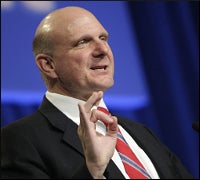 |
| Microsoft CEO Steve Ballmer at the company’s annual shareholder meeting today. Source: Microsoft |
“The best is yet to come.”
While the words recall the melody of the syrupy ’60s Sinatra hit, those were the words that Microsoft CEO Steve Ballmer used to send a message to shareholders when he spoke at the company’s annual meeting this morning.
Even while he exhibited his typical optimism toward the future, of course, Ballmer acknowledged the threat from the current economy.
“For Microsoft, every year is better than the last one — but we have no control over the [financial environment,” he said.
One thing that Microsoft does have control over is whether it decides to pursue a deal with embattled Web media giant Yahoo. In the wake of Yahoo CEO Jerry Yang’s decision to step down this week, however, Ballmer reiterated that Microsoft’s (NASDAQ: MSFT) interest in purchasing the company is over.
“We are done with all acquisition discussions with Yahoo,” he said. “We did our best, [but it] didn’t make sense to them so we moved on.”
That comes in spite of the fact that some industry-watchers have seen Yang’s departure as clearing the way for a dealmaker to step into the role and facilitate a sale to Microsoft.
Still, Ballmer did add the caveat that the Yahoo (NASDAQ: YHOO) and Microsoft might have “a discussion regarding search,” although he didn’t provide much in the way of detail.
“I’ve been clear that, if they were interested, it would still be interesting to look at a search collaboration,” he said. “There’s no discussion on that front but we’d be very open to it.”
The companies had previously talked about a deal involving a sale of just Yahoo’s search business. However, Yang earlier this month said keeping control of its search was critical for Yahoo.
At press time, shares of Yahoo were trading down 21 percent to $9.08 — marking the company’s lowest stock price in five years. Microsoft stock was down 6.52 percent to $18.34.
Changing strategies
Today’s shareholder meeting, as in previous years, took place at the convention center in Bellevue, Wash. — a suburb nearby Microsoft’s headquarters in Redmond.
During his presentation, Ballmer also gave the gathered shareholders a quick, non-technical description of the company’s long-range strategies to remain relevant as the industry and Microsoft move into an increasingly connected world. In it, services exist in “the cloud” and customers connect to their data and contacts via services provided on PCs, smartphones, and the Web.
“It’s a transition that will let us connect seamlessly, no matter where people are in the world,” Ballmer told the audience.
To cash in, Microsoft has been investing in a broad set of products and initiatives. Those include the Azure cloud platform services announced last month, Live Mesh for syncing users’ files across devices, Windows Live services for end users, Windows 7 and in coming, hosted versions of the company’s application suite, dubbed Office Web.
All are part of Microsoft’s long-term plan to migrate from its traditional PC software sales model to its emerging “software plus services” model, which also includes advertising and subscriptions as major income sources.
Ballmer also touted the company’s continued ability to grow profits, even in a down economy.
“We are among the top two or three of the top operating-income companies in the U.S.,” he added.
In October, Microsoft reported flat year-over-year earnings of $4.37 billion for the first quarter of fiscal 2009, which ended Sept. 30. The company still produced record revenues of $15.06 billion for the quarter, however.
In fiscal 2008, Microsoft brought in $60.42 billion in revenues and $17.68 billion in income.
Microsoft is taking steps to fight the downturn, though. One move will be cutting budgets across the board, and while the company will continue hiring, it will be at a “much” reduced rated, the company said.
[cob:Special_Report]”The last two years have been the best years for recruiting software developers in the company’s history,” Ballmer said. “We’re in the best of times in terms of this industry.”
Microsoft also will continue to invest in research and development, although at a decreased rate, company officials said.
To one question from the shareholders regarding counterfeiting, particularly in China, Ballmer answered that “it’ll take some patience, but China looks like more of an opportunity” than a problem.
Microsoft Chairman Bill Gates, who left full-time work at the company in June, also put in a public appearance — but kept a generally low profile.
Gates did seize the opportunity to praise Jon Shirley, a former Microsoft president, who retires from the company’s board of directors this month. Shirley joined Microsoft in 1983 and retired from day-to-day activity with the company in 1990.
“Software has transformed the world since the first Microsoft shareholders meeting in 1986,” Gates said. “Ten years from now, what we see will be more advanced than anything we’ve seen in the last 22 years.”
Gates also joked that, since his retirement, he hasn’t yet made the mistake of driving east to company’s Redmond campus to work in the morning, instead of west, toward his charity in Seattle.
The company’s shareholders also voted down a proposal by one shareholder who called for Microsoft to rescind its long-running program of offering benefits for same-sex partners. Less than 5 percent of shareholders’ votes favored the proposal. Microsoft has repeatedly come under fire from anti-gay groups in recent years over the benefits program.


